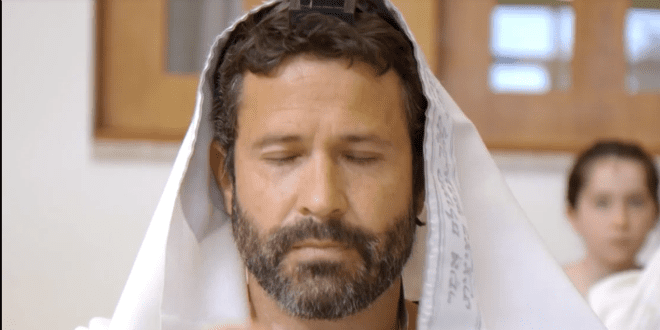A new music video aspires to change the way the world prays. It may sound incredible or fanciful, but it packs a real punch and just may succeed.
It is immediately clear that Rabbi Jeremy Gimpel’s new music video is special. The music is a pleasure to listen to but there is much more that clearly adds to that experience. The words are Hebrew, Psalms 150, and the video was filmed with an impressive backdrop: Nahal Arugot where King David wrote those very words.
Hallelujah. Praise Hashem in His sanctuary; praise Him in the sky, His stronghold. Psalms 150:1
The video is the culmination of a long period of prayer and introspection. Rabbi Jeremy Gimpel has been working on a powerful approach to prayer that is firmly rooted in the actual land of Israel, meditating on the subject for the past year and even moving his family to eastern Gush Etzion in the hills of Judea. Like all great discoveries, his revelation about the essence of prayer came after a dark period.
“I was having difficulty connecting to prayer in synagogues so about four years ago, I started coming to these hills to pray in the early morning,” Rabbi Gimpel told Breaking Israel News. Though he does not self-identify as a musician, his efforts to connect with prayer took a decidedly musical turn. “I would bring my guitar and just pour my heart out. Words began to come and so did melodies.”
Rabbi Gimpel noted that Jewish prayer is structured and the prayer book is called a siddur since the word literally means ‘order.’ The morning prayer in the siddur opens with verses from psalms as a preparation for prayer.
“I realized that the first part of the siddur was psukei dzimra, which literally means verses of song,” Rabbi Gimpel said. “Unfortunately, the way it is done in many synagogues today is ‘verses of mumbling.’ So I came out to these mountains and sang them, literally sang them out with all my heart, and the music just came to me.”
For Gimpel this was entirely unexpected:
“I never thought I would put out a music album but I thought that maybe the music came to me because the world needs to learn how to say these prayers the right way, the way that comes from the actual land where King David wrote them.”
Rabbi Gimpel eventually relocated his family to the region in Israel that was the source of his prayer. He co-founded Havat Arugot, the spiritual retreat his organization, The Land of Israel Network, established in the Judean Hills in Eastern Gush Etzion.
“I immediately noticed the change in my life,” he said. “I was never a morning person but suddenly, I started going to bed early and waking up way before dawn.”
The rabbi cited the first section of the Shulchan Aruch, the Jewish code of law, which states, “One should strengthen himself like a lion to get up in the morning to serve his Creator, so that it is he who awakens the dawn.”
“I started practicing this to the best of my ability and saw how important it was,” Gimpel remarked. “If you perfect your morning, you change your entire day. If you start off the morning spiritually powerful, then your entire day will be spiritually powerful. And if you change your days then you will change your life.”
Though his approach to prayer is centered in Israel, Gimpel stated that it is universal.
“This approach to prayer is not just for Jews. This is for the entire world,” he maintained. “This album was more than just music to accompany prayers. There is really a Torah, a teaching behind it inside the music. It is a way of being, a way of re-aligning yourself. This is the way the prophets of Israel passed it down; as a way of being in this world since this is not an easy world to be in. This is a technique, literally spiritual technology for strengthening yourself.”
Rabbi Gimpel explained how the land of Israel is an integral part of prayer even when performed outside of the borders. He described how Daniel prayed in Babylonia by opening a window facing the land in order to feel closer to Israel, specifically Jerusalem, while praying.
When Daniel learned that it had been put in writing, he went to his house, in whose upper chamber he had had windows made facing Yerushalayim, and three times a day he knelt down, prayed, and made confession to his God, as he had always done. Daniel 6:11
“We learn from this that prayers need to be focused geographically and not just spiritually,” Rabbi Gimpel said. “And there is only one city the Bible calls for people to pray for.”
Pray for the well-being of Yerushalayim; “May those who love you be at peace. Psalms 122:6
“Spiritually, the center of the world is Jerusalem,” he explained. “This is not exclusively for Jews. This is obviously for anyone who believes in God, believes in the Bible, and believes in prayer. This is where redemption is going to emanate from. You have to be aligned physically and spiritually to be part of God’s plan on earth. By aligning your prayers toward Jerusalem, you are aligning your needs, your family’s needs, and even your national needs, with God’s plan.”
This is a mission Rabbi Gimpel takes seriously.
“The mandate of the Jewish people is to be a light unto the nations. In the last decade, many Jews have answered that call be teaching Torah. But the Temple experience was not an intellectual experience. It necessarily included song and prayer. That was the encounter with God. Our mission isn’t accomplished until we teach the entire world how to pray.”
“The Moshiach (Messiah) will only come when all of mankind unites in prayer,” Gimpel said. “And anywhere you go in the world, there is one word that is absolutely universal: Hallelujah.”




